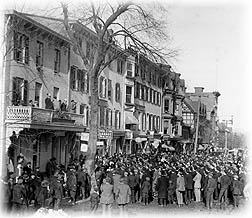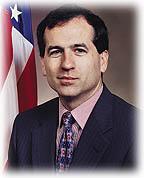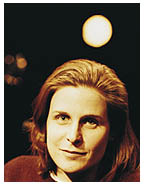 From the Archives
From the Archives
Class Notes - March 8, 2000
Class notes features
Decades ago, St. Patrick's Day was an occasion for the senior class to
have a bit of fun. According to accounts in early issues of paw and from
records in the university's archives, seniors held a parade on campus and
through the town. Various academic departments sponsored floats, and students
dressed in costume and satirized public figures. This photo from 1912 shows
seniors gathered in front of the Nassau Inn (located at that time on Nassau
Street) listening to a speech delivered from the inn's balcony.
Robert Ray '82 picks up where Ken
Starr left off
Continuing a six-year-old investigation of the Clintons
 Those who knew him best at Princeton would not have voted Robert Ray
'82 most likely to succeed Ken Starr.
Those who knew him best at Princeton would not have voted Robert Ray
'82 most likely to succeed Ken Starr.
Appointed last October to take Starr's place at the head of the now six-year-old investigation into alleged wrong doing by President Clinton's administration, Ray was "almost a Kennedy-worshipping liberal Democrat" when he was at the university, says one of his roommates, Carl Blumenstein '82.
Now, to another Kennedy-worshipping Democrat, Ray represents a ticking time bomb. For when President Clinton becomes Citizen Clinton next January 20, it could be up to the young independent prosecutor to decide whether Clinton should be prosecuted for perjury and obstruction of justice. The Senate may not have wanted to oust him from office for it, but there are those who believe that equal justice under the law demands that Clinton be prosecuted for lying under oath about his relationship with former White House intern Monica Lewinsky.
Ray is not talking up that explosive possibility. Yet he's not ruling anything out either. "The investigation continues," he said in a recent interview. "Beyond that, I cannot comment."
In addition to deciding whether the president deliberately tried to stymie the Lewinsky investigation with untruths and witness intimidation, Ray must complete work and write final reports on several investigations, including the possible misuse of FBI files on employees who worked for Republican administrations and the original Whitewater real estate deal, which prompted the appointment of an independent counsel in 1994.
Inspired by a course he took in English constitutional history with Professor Bill Jordan, Ray went on to law school at William and Mary University. From there, he became a federal prosecutor in New York City, hired for the job by Rudy Giuliani, who is now the mayor of New York City.
Though Ray says he's not a "Giuliani clone," he's sensitive to the fact that the man who gave him his start as a prosecutor is an all-but-declared Republican candidate for the Senate. One of the investigations Ray must complete involves the role that Giuliani's opponent, First Lady Hillary Rodham Clinton, played in the firing of five career White House travel office employees.
So don't look for the independent counsel's report on that super-sensitive matter to be released on the eve of the fall election. "I have been charged with responsibly conducting the work of this office, and in that regard some of my responsibility is to ensure that there is no untoward effect on the political process," Ray said.
Princeton's appeal
Ray was inspired to go to Princeton by "Dollar Bill" Bradley '65, a Democratic candidate for president this year. "I was a basketball player growing up, and I was a big New York Knicks fan," Ray explained. "When I was about 14 or 15, Princeton was in the NIT finals at Madison Square Garden, and they won that tournament. "It made a huge impression on me."
But at Princeton, Ray had to come to terms with the fact that at 5' 9", he wasn't material for Pete Carril's varsity team; he settled for pickup games. Ray also joined Cottage Club-but only after two painful rejections that led him to write a thoughtful op-ed piece about the bicker process for The Daily Princetonian. In it, the future tough-guy prosecutor didn't mind admitting that "I cried after receiving the bad news."
Ray's high-school sweetheart used to come up for big weekends on "the Street." Today, they're married. She and the Rays' three children live on the Jersey shore. Ray, who worked for Independent Counsel Don Smaltz's investigation of former Agriculture Secretary Mike Espy before joining Starr's staff, has been making the three-hour ferry-cab-and-plane commute for almost five years. In Washington, he bunks in his boyhood bedroom at his parents' suburban home.
He realizes that "the average guy on the street" probably wonders: "We went through this. We had this trial. What are you still doing here?"
Ray has promised the three-judge panel that must decide next August whether to re-up his contract "substantial progress" this year. "My job is to promptly, responsibly, and in a cost-effective way come to the conclusion of this investigation." But, he added, "It ain't over till it's over."
-Kathy Kiely '77
Kathy Kiely is a reporter for USA Today in Washington, D.C.
Theater with a twist
 Ellen Beckerman '91 creates new plays out of the
old
Ellen Beckerman '91 creates new plays out of the
old
Praise for a playwright often comes in the form of curtain call cries of "Author! Author!" But at the end of her own productions, writer and director Ellen Beckerman '91 might well stay seated. "I feel funny calling myself the author," she says. "I use a very collaborative process."
Throw away any ideas of an autocrat sitting in the back of the theater yelling at actors to hit their cues. Instead, Beckerman works with a group of about seven actors to shape the text, using a movement-based, abstract style in productions of both her own work and others' material. Her latest project, a new spin on Hamlet, which will run from March 15 through April 1 at New York's HERE performance space, raises an additional challenge: how to make fresh a play that's been interpreted and performed umpteen times.
Beckerman cut the four-hour play to 90 minutes, and in her version the characters begin the play in Purgatory and are doomed to eternally repeat their roles, beginning again at Act I after they've finished the final scene. They're aware that they're trapped in a play, and are looking for a way out of their dilemma.
 Beckerman is familiar with putting new twists on classic texts; in a
previous production, she brought a darker spin to Alice in Wonderland in
a play she called Alice's Evidence, and which featured gas masks, junkies,
and Caterpillar sucking Alice's finger.
Beckerman is familiar with putting new twists on classic texts; in a
previous production, she brought a darker spin to Alice in Wonderland in
a play she called Alice's Evidence, and which featured gas masks, junkies,
and Caterpillar sucking Alice's finger.
As a teenager, Beckerman preferred creative writing and classical piano, and while she took acting class and worked as a stage manager at Princeton, she never thought seriously about a career in theater. Instead, she majored in history-writing her thesis on the education of American Indian children around the turn of the 19th century-and planned to go to law school; she took the LSAT and lined up a job as a paralegal. But as she was packing up the last of her boxes during the final week of senior year, the phone rang: It was the prestigious Steppenwolf Theater, offering her an internship that she'd forgotten she'd even applied for. She moved to Chicago and ended up staying, becoming literary manager at Steppenwolf after her internship ended, and in her free time, directing. "Chicago is a very easy place to get started," she says. "There are lots of little theater companies-it feels like camp."
Beckerman knew early on that she didn't want to do the realistic plays that are the hallmark of Chicago's theater scene; instead she directed a highly abstract adaptation of Gertrude Stein's Saints and Singing. She describes it as an "unbelievable challenge," not least because many actors thought the play, and her approach, odd. "They would look at the text and not understand it," she says. "They thought it was a weird play that didn't make sense."
After three years, and 15 or 20 more plays, some experimental and others more conventional, Beckerman moved to New York, where alternative theater enjoys a strong following. She spent her days temping in law firms, but during the evenings and weekends she worked with some of her theatrical idols, including directors Robert Woodruff and Richard Foreman. She wrote her first original work, a movement-based piece called Half, which appeared in a theater festival. And occasionally she'd take off for a months-long stint in Thailand, where she taught drama and helped produce plays. Now she spends about half her time directing her own work and half the time directing others' texts, working with an ever-changing core of actors. During rehearsals and a show's run, she temporarily leaves her job at the law firm to give her full attention to the production.
It's not the easiest schedule, or lifestyle. When she first announced to her parents that she'd found her calling and wouldn't ever be going to law school, they were less than thrilled. "They wondered how I was going to support myself," she says, "and I thought: 'I have no idea!'" But now, after several years in the business, she finally considers herself a playwright and director above all.
-Katherine Hobson '94
Katherine Hobson is a staff reporter at TheStreet.com.
GO TO the Table of Contents of the current issue
GO TO
PAW's home page